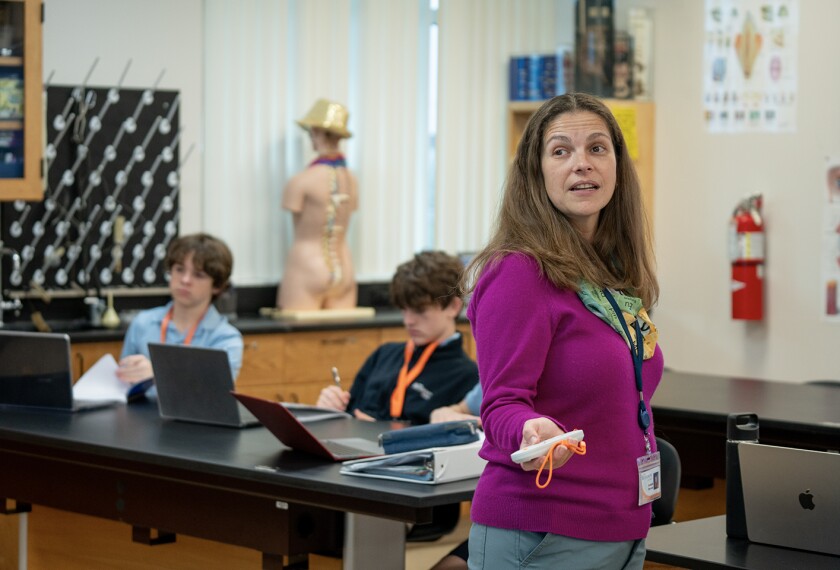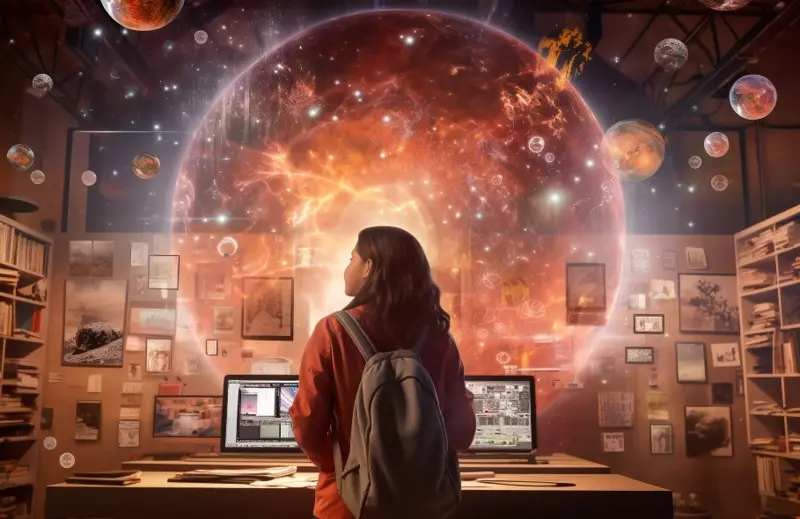Picture this: a classroom with no teachers, just robots and computers guiding students through their lessons. Sounds a bit like a sci-fi movie, right? Yet, as AI technology advances, the question arises - will AI replace teachers? In this post, we explore the role AI might play in the future of education.
We'll dive into how AI is currently being used in classrooms, from personalized learning plans to automated grading systems. But can these tech advancements truly take over the unique human touch that teachers bring? We'll weigh the pros and cons of AI's increasing influence in education and discuss why a teacher's role might evolve but not vanish.
By the end of this post, you'll gain insight into the potential future of teaching and how AI might change educational landscapes. Prepare to discover whether teachers need to worry about being replaced or if there's room for both humans and robots in the classroom.
Explore this post with:
Table of contents
AI in the Classroom: Friend or Foe?
Teachers are navigating a landscape where AI is both a tool and a concern. According to an ABC News article, while experts predict AI may reduce teaching jobs, many educators see it as a supportive tool rather than a replacement. This view is echoed by Debbie Critchfield, Idaho's Superintendent of Public Instruction, who notes that teachers remain the most important component in the classroom.

Credits: Swivl.com
A study by the AI Education Project reveals educators are split on AI's impact on careers. Some see AI enhancing personalized learning and lesson planning, while others fear losing the human touch. The demand for AI-specific resources is high, with 80% seeking more professional development, highlighting a need to adapt but not replace the teacher's role.
On a broader scale, the ScienceDirect study suggests that while some believe AI could replace educators, many argue the unique human qualities of teachers—like creativity and emotional intelligence—are irreplaceable. This sentiment is supported by research indicating that human interaction is irreplaceable, despite AI's growing presence.
Which Teacher responsibilities AI can handle
Artificial intelligence (AI) is making significant inroads into the teaching profession, with various tasks and responsibilities poised for automation. For instance, grading takes up a considerable amount of a teacher's time. AI tools like Gradescope can automate the grading of assignments, providing quick feedback and enabling teachers to focus more on instruction rather than paperwork.

Credits: Photo by Getty Images
Other areas where AI can lend a helping hand include lesson planning and material creation. Tools such as MagicSchool.ai can assist teachers in generating lesson plans tailored to their students' needs, thereby streamlining preparation. Additionally, AI-driven programs can provide personalized learning experiences by adapting educational content based on individual student performance, reducing the need for one-on-one instruction. According to Education Week, this allows teachers to better meet diverse learning needs without significantly increasing their workload.
What Aspects of Teaching AI Cannot Replace
Despite the rise of AI in various sectors, certain aspects of teaching remain uniquely human. According to a study by EdWeek, emotional support is a crucial element that AI cannot replicate. Teachers provide a safe and nurturing environment, offering emotional guidance and understanding that foster student growth. This human connection is critical for effective learning and cannot be substituted by technology.

Credits: Education Week
Teachers also excel in building relationships with students, something AI struggles with. These relationships are based on understanding individual student needs, which allows educators to adapt their approaches accordingly. As highlighted in a MIT study, AI can handle routine tasks, but the nuances of human interaction, empathy, and ethical guidance remain irreplaceable aspects of teaching.
Career Pivot for Teachers in the AI Era
As AI technologies reshape the educational landscape, the role of teachers is evolving from traditional instruction to becoming facilitators of learning. Teachers will need to embrace AI as a tool to enhance personalized learning experiences and foster critical thinking and problem-solving skills among students. According to a conceptual framework by Dr. Maxwell Benjamin Balraj, teachers should shift towards a collaborative role with AI systems, focusing on adaptive facilitation and ethical oversight.

Credits: Education Week
To adapt to the AI era, teachers must develop AI literacy and digital competencies. This includes understanding AI tools, their applications, and ethical implications in education. As noted in the AI Literacy White Paper, continuous professional development is vital for teachers to stay informed about emerging technologies and pedagogical strategies. By participating in ongoing education, teachers can ensure they are equipped to guide students effectively in an increasingly automated world.
Teacher hiring trends in the US
The US teacher job market in 2025 faces significant challenges, with an estimated 411,549 teaching positions either unfilled or held by not fully certified teachers. This figure represents about 1 in 8 teaching roles nationwide. The Learning Policy Institute reveals that 48 states and the District of Columbia are grappling with these shortages, driven by high teacher attrition and declining interest in the profession.

Credits: LinkedIn
- States like Florida, Arizona, and California are among those experiencing severe shortages, making them hotspots for job seekers in the teaching field. Conversely, states such as Vermont and New Hampshire face fewer challenges. As Fullmind Learning points out, the demand for teachers in areas like Early Childhood Education and STEM subjects remains high. However, overall job openings have decreased, reflecting a broader trend of a cooling labor market.
Is Teacher AI safe?
The role of teachers in the classroom appears to be secure from the advances of AI, as many experts agree that while AI can assist with tasks, it cannot replace the intrinsic qualities that educators offer. As highlighted by a UNESCO paper, teachers bring empathy, ethical reasoning, and critical thinking to their interactions with students, qualities that AI simply cannot replicate. Furthermore, AI is increasingly viewed as a supportive tool that enhances educational practices rather than as a replacement for teachers.

Credits: Swivl.com
Various studies, including one by the AI Education Project, indicate that educators are learning to leverage AI for better personalized learning experiences and lesson planning. While concerns about job security persist, the consensus is that AI's role is to alleviate burdens such as grading and administrative tasks. Teachers can then focus more on building genuine connections with their students, a facet of education that remains uniquely human and irreplaceable.
Hiring Teachers? Here's What to Look For
The role of a teacher is evolving, especially with AI changing how classrooms work. Beyond traditional pedagogy, look for candidates with AI literacy and digital proficiency who understand AI's basics, its uses, and ethical considerations for responsible integration [Source 1, Source 6]. Teachers should also show strong critical thinking and problem-solving abilities to guide students through data-rich AI outputs [Source 1, Source 2].

Credits: Dr. Tyler S. Thigpen via LinkedIn
Finding educators with these modern skills can be a challenge. That's where Adaface comes in! Our skill assessments help you objectively screen candidates, saving time and leading to better hiring choices [Source 13, Source 14]. For example, Adaface's Prompt Engineering Test measures how well candidates can craft instructions for AI tools, a telling sign of their adaptability.
To truly understand a teacher's comfort and skill with AI, consider using the Generative AI Test. Adaface tests provide clear insights into a candidate's readiness for an AI-integrated classroom, ensuring you find talented individuals who can blend technology with human-centered teaching [Source 18, Source 19].
Prompt Engineering Test
Generative AI Test
Management Trainee Test
Embracing a Brighter Horizon: AI's Promise for Educators
Looking ahead, AI serves not as a replacement, but as a powerful partner, transforming the teaching profession into an even more rewarding journey. Educators can now hand over time-consuming administrative burdens, like creating lesson plans and grading, to AI assistants, freeing up precious hours, as highlighted by eLearningIndustry and ScienceDirect. This shift allows teachers to amplify what only humans can do: cultivate meaningful student relationships and spark genuine curiosity, a sentiment strongly supported by Faulkner University and ColorWhistle.

Credits: College of Education | Illinois
For current teachers, this means deeper engagement and tailored instruction, while for those hiring, it means attracting professionals ready to shape future-forward learning environments. By integrating AI responsibly, educators guide students to master groundbreaking technology, developing skills that are highly relevant for tomorrow's workforce, as noted by Faulkner University and Education International. The future of education is a collaborative masterpiece, blending human insight with technological ingenuity, ensuring a dynamic and impactful learning experience for all.

40 min skill tests.
No trick questions.
Accurate shortlisting.
We make it easy for you to find the best candidates in your pipeline with a 40 min skills test.
Try for freeRelated posts



